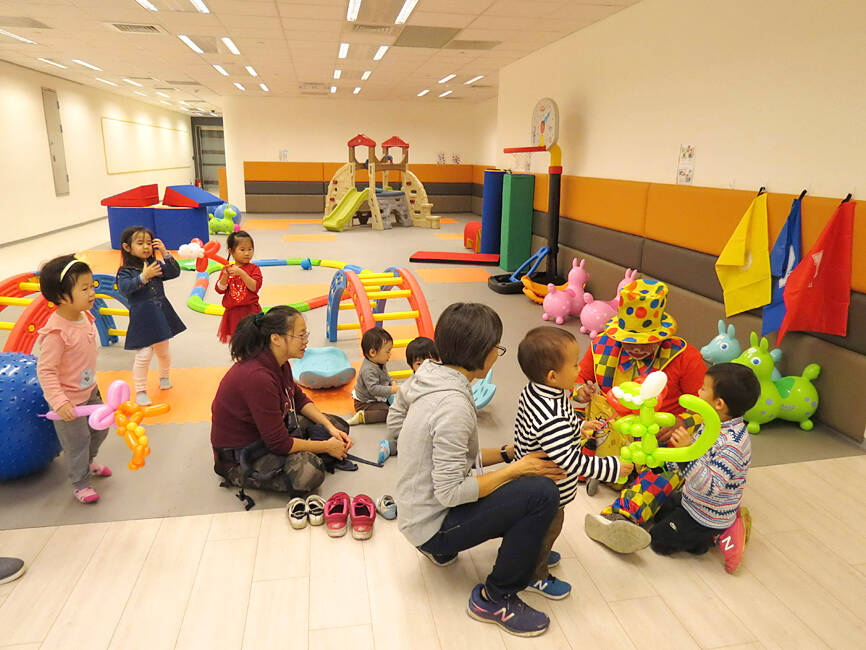Children born to employees of Taiwan Semiconductor Manufacturing Co (TSMC) accounted for 1.8 percent of Taiwan’s newborns last year, the world’s largest contract chipmaker said on Friday.
In its most recent environmental, social and governance newsletter, TSMC said that employees at its plants in Taiwan gave birth to 2,463 children last year. A total of 135,571 children were born in the country.
New births in Taiwan fell to a new low last year. However, the number of children born to employees at TSMC plants in the country rose by about 1.7 percent from 2,368 in 2022, the newsletter said.

Photo: Su Chin-feng, Taipei Times
The “TSMC Child Care Benefit Program 2.0” helps it promote a family-friendly workplace, providing a secure and enriching educational environment for employees’ children at its science park campuses, the chipmaker said.
Under the childcare program, eligible employees are granted up to 12 weeks of paid maternity leave for a first child, 16 weeks for a second child and 20 weeks for a third child or more, TSMC said.
The company also provides 10 days of paid paternity leave so employees can spend time with their spouse for prenatal checkups and newborn care.
In addition, the company’s Employee Welfare Committee provides NT$10,000 in childbirth subsidies and up to NT$10,000 in public group insurance for each birth, TSMC said.
The chipmaker has built four preschools on its campuses in science parks at Hsinchu, Taichung and Tainan for children aged two to six, it said.
Childcare services are also available from 7am to 8pm to accommodate employees’ work schedules, TSMC added.
Last year, the company made its preschools available to employees of subsidiaries and affiliates, such as image sensor foundry services provider VisEra Technologies Co Ltd, contract chipmaker Vanguard International Semiconductor Corp and application-specific integrated circuit designer Global Unichip Corp.
Starting this year, TSMC plans to further expand its services. It will allow the children of those who work at science park management bureaus and other companies to attend the preschools, it said.
The chipmaker had 67,000 employees in Taiwan at the end of last year.

Taiwanese can file complaints with the Tourism Administration to report travel agencies if their activities caused termination of a person’s citizenship, Mainland Affairs Council Minister Chiu Chui-cheng (邱垂正) said yesterday, after a podcaster highlighted a case in which a person’s citizenship was canceled for receiving a single-use Chinese passport to enter Russia. The council is aware of incidents in which people who signed up through Chinese travel agencies for tours of Russia were told they could obtain Russian visas and fast-track border clearance, Chiu told reporters on the sidelines of an event in Taipei. However, the travel agencies actually applied

New measures aimed at making Taiwan more attractive to foreign professionals came into effect this month, the National Development Council said yesterday. Among the changes, international students at Taiwanese universities would be able to work in Taiwan without a work permit in the two years after they graduate, explainer materials provided by the council said. In addition, foreign nationals who graduated from one of the world’s top 200 universities within the past five years can also apply for a two-year open work permit. Previously, those graduates would have needed to apply for a work permit using point-based criteria or have a Taiwanese company

The Shilin District Prosecutors’ Office yesterday indicted two Taiwanese and issued a wanted notice for Pete Liu (劉作虎), founder of Shenzhen-based smartphone manufacturer OnePlus Technology Co (萬普拉斯科技), for allegedly contravening the Act Governing Relations Between the People of the Taiwan Area and the Mainland Area (臺灣地區與大陸地區人民關係條例) by poaching 70 engineers in Taiwan. Liu allegedly traveled to Taiwan at the end of 2014 and met with a Taiwanese man surnamed Lin (林) to discuss establishing a mobile software research and development (R&D) team in Taiwan, prosecutors said. Without approval from the government, Lin, following Liu’s instructions, recruited more than 70 software

BACK TO WINTER: A strong continental cold air mass would move south on Tuesday next week, bringing colder temperatures to northern and central Taiwan A tropical depression east of the Philippines could soon be upgraded to be the first tropical storm of this year, the Central Weather Administration (CWA) said yesterday, adding that the next cold air mass is forecast to arrive on Monday next week. CWA forecaster Cheng Jie-ren (鄭傑仁) said the first tropical depression of this year is over waters east of the Philippines, about 1,867km southeast of Oluanpi (鵝鑾鼻), and could strengthen into Tropical Storm Nokaen by early today. The system is moving slowly from northwest to north, and is expected to remain east of the Philippines with little chance of affecting Taiwan,